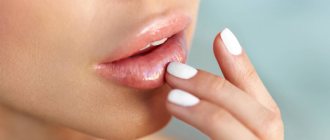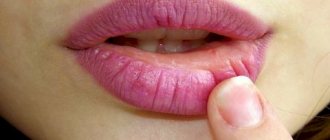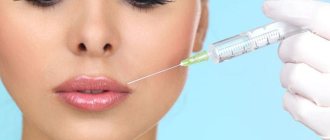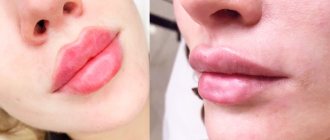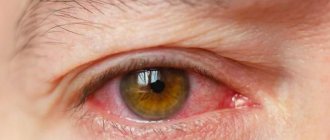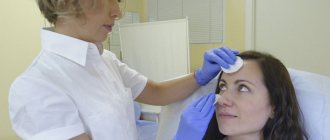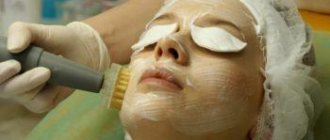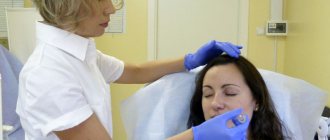Cheilitis is an inflammation of the red border, mucous membrane and skin of the lips. In common parlance, the disease is called jamming. The inflammatory process can be long-lasting and periodically worsen. In healthy young people it often goes away on its own, but in children, the elderly and people with chronic diseases it should be treated with medication. Elderly people have a high risk of leukoplakia and malignancy of the process.
Cheilitis is treated by a dentist, and if necessary, a therapist, pediatrician and other specialized specialists - an endocrinologist, an infectious disease specialist, etc. - are involved in drawing up a treatment plan.
Causes of cheilitis
Cheilitis can be an independent disease and a manifestation of other pathologies of the mucous membranes and internal organs. The most common causes of the disease include:
- Dermatoses. The mucous membranes and skin of the lips can be involved in the pathological process in lichen planus, psoriasis, erythematoses and other skin diseases.
- Unfavorable factors. Exposure to hot and cold air, wind, and excessive exposure to UV rays are especially common causes of cheilitis in people who work outdoors and under special weather conditions.
- Allergic reactions. Allergies can be triggered by chemical factors, ultraviolet rays, cosmetics, etc.;
- Other diseases. Secondary cheilitis often develops against the background of atopic dermatitis, eczema, neuritis of the facial nerve, etc.
Natural protective mechanisms are weakened by such factors as hypothermia, previous surgical interventions, long-term antibacterial therapy, hypovitaminosis, etc.
Ask a Question
Causes of a crack in the lower lip
There are many reasons for the development of this pathology:
- anatomical features of the lip;
- permanent mechanical damage;
- weather conditions (if people are interested in prices for mole removal all year round, then the problem of a crack in the lower lip is usually solved in the cold season);
- the neurotic nature of the person’s actions – regular licking of lips, biting them, etc.;
- avitaminosis;
- metabolic disorder;
- dry skin, etc.
Symptoms and types of disease
Cheilitis on the lips can manifest itself in different ways depending on the form of the disease. Thus, the exfoliative type of inflammation appears more often in women; its main symptom is peeling. The disease is based on neurological and endocrine disorders. Peeling occurs on the red border of the lips and does not affect the skin and mucous membranes. The disease rarely spreads to the entire red border, so part of it remains unchanged.
With severe dry skin, peeling is accompanied by symptoms such as:
- feeling of dry lips;
- burning;
- formation of easily detachable scales.
The disease is long-term and sluggish, with periods of exacerbation occurring from time to time. It rarely goes away on its own. With the exudative form, pain, swelling of the lips, and the formation of large crusts may occur.
Glandular cheilitis develops against the background of the proliferation of minor salivary glands and their subsequent infection. With congenital pathologies, signs of such inflammation of the lips are present in almost all cases. Acquired overgrowth may be associated with chronic diseases of the periodontal tissues, tartar, multiple caries - diseases leading to infection of the dilated ducts. Lesions of the lower lip with this form of cheilitis are more common. The disease develops with the appearance of dry lips, which is initially easy to correct with the help of cosmetics. Subsequently, cracks begin to form, deepen and begin to bleed. The condition is aggravated by the constant desire to lick dry lips - cracks and ulcers can become weeping and become permanent due to the inelasticity of the skin of the lips.
Contact allergic cheilitis develops after exposure to an allergen - an irritant. The most common of them are components of lipsticks and other care products. Allergies can also be associated with bad habits, for example, constantly keeping pencils, pens and other foreign objects in the mouth. Musicians may develop occupational cheilitis due to constant contact of the mouthpieces of wind instruments with their lips. The main symptoms of the disease include:
- severe itching;
- burning;
- swelling of the lips;
- redness of the skin and mucous membranes.
Manifestations intensify upon contact with the allergen. Bubbles of different sizes may form; their spontaneous or accidental opening leads to the formation of ulcers and cracks. Chronic forms of allergic disease are accompanied by peeling, slight itching and the absence of other signs of inflammation.
Actinic cheilitis belongs to the category of diseases that are based on increased sensitivity to weather and other external factors. Usually occurs in response to sun exposure. Exudative forms of this disease are accompanied by the formation of crusts. Sometimes small blisters form, the opening of which leads to painful erosions. In the absence of exudate, the main symptoms are pain, dryness, and burning of the lips. Actinic cheilitis often degenerates into precancerous diseases.
In atopic cheilitis, the main cause of the disease is dermatitis of the same name, or neurodermatitis. It appears in people with an allergic predisposition, and the triggering factor can be medications, cosmetics, food products, as well as microorganisms and their waste products. The disease is accompanied by redness of the lips, itching and peeling of the red border, and damage to the corners of the mouth. After acute symptoms subside, peeling and thickening of the skin may occur. Dryness stimulates the formation of cracks.
Macrocheilitis is part of the Rossolimo–Melkersson–Rosenthal syndrome. Appears against the background of neuritis of the facial nerve and the symptom of a folded tongue. Develops due to infectious-allergic effects against the background of genetic predisposition. Manifests itself with the following symptoms:
- lip enlargement;
- severe itching;
- swelling of other parts of the face;
- bluish-pink color of swollen areas of the lips.
One or both lips, cheeks, and upper parts of the face may be affected. Neuritis leads to facial asymmetry, and the nasolabial fold is smoothed out.
Hypovitaminous cheilitis of the lips develops against the background of a deficiency of B vitamins. Burning and dryness of the oral mucosa and lips appear. The mucous membranes become swollen and red, peeling occurs on the red border, and cracks appear. They are prone to bleeding, which is also associated with a lack of vitamins. The tongue may become enlarged and can easily become imprinted with teeth.
With candidal cheilitis, the inflammatory process is accompanied by the formation of white plaque on the mucous membranes. The cause of this disease is the proliferation of a fungus of the genus Candida; it often affects infants, people after radiation and chemotherapy, as well as patients with immunodeficiencies. Cheilitis develops with long-term use of antibiotics and immunosuppressants.
Why do lips crack and peel, and what can you do about it? Expert advice
We asked dermatologists what to do if your lips peel and crack, and how to properly care for them if the balm does not help.
Experts:
- Olga Fem is a cosmetologist-esthetician with a medical education, the founder of the website kosmetologa.net.
- Alexander Prokofiev is a dermatovenerologist, medical expert of the La Roche-Posay brand.
- Svetlana Kovaleva is a dermatologist and cosmetologist.
- Evgenia Reshetnikova is a dermatovenerologist, cosmetologist, and head of the medical department at Sesderma.
What causes lips to become dry and flaky?
Most often due to improper care. For example, lack of protection when it is needed.
The fact is that lips are deprived of natural defense mechanisms. This zone is a transition zone between the skin of the face and the oral mucosa, so the skin here has an atypical structure. It is thinner (three layers, not five, no shiny or grainy). The upper stratum corneum is also very thin, and complete keratinization does not occur in it (which is why the lips are soft). The skin of the lips does not contain melanin and is not able to reflect the effects of sunlight. It has a reduced ability to accumulate and retain water. Moisture evaporates much faster than from other areas of the face, and this leads to dryness, flaking, and the risk of inflammation.
Okay, this is in general, but more specifically, why do peeling appear?
There are external and internal reasons. External:
1. You do not use balm before going outside in cold weather (frost, wind). It creates an occlusive film on the surface of the lips, which prevents moisture evaporation and serves as a protective barrier.
2. You do not use a balm with SPF during periods of increased solar activity.
“Because the skin of the lips does not contain melanin, it cannot tan, but it can get burned. A burning sensation and dryness appear,” explains Evgenia Reshetnikova. “ An ordinary balm, without a sun protection factor, does not work here. On the contrary, you risk increasing the skin's sensitivity to ultraviolet radiation : the balm, like a lens, will increase exposure to rays.
It is advisable to use a balm with SPF in winter, especially if you are into mountain sports: snow reflects the sun's rays. Apply the product before going out into the sun and reapply every 1.5-2 hours.”
3. Dry air at home and in the office . It is known that hot dry air (from batteries, heaters) dries out the skin. But cold (from the air conditioner), according to experts, is no better.
“It is advisable to maintain humidity at 40-60%,” advises Olga Fem. “Unfortunately, 30% in an apartment in winter is a common occurrence. Buy a humidifier if possible."
4. You lick or bite your lips when you're nervous. Try to keep an eye on this.
5. You breathe through your mouth , and this quickly dehydrates your skin. We need to fight the cause of nasal congestion.
6. You regularly go to a dry (Finnish) sauna, a swimming pool with chlorinated water, and often swim in the sea . The same advice - use balm.
7. Frequent and unnecessary use of lip balm.
Olga Fem: “ Balm and hygienic lipstick are not products for regular care, but for temporary protection. With constant use, they worsen the condition of the lips. Why is that? A barrier film on the surface of the skin prevents moisture evaporation. In certain situations this is useful - for example, in the cold. But, in general, evaporation is a natural physiological process. If the balm is constantly on the lips, the cells do not receive a signal that the natural barrier needs to be repaired - after all, there is an artificial one on the lips. Over time, this leads to the fact that you cannot do without chapstick at all. It’s similar to the situation with smoking: another cigarette quickly relieves discomfort, but it also maintains addiction. How to break the vicious circle? Stop using balms and hygienic lipsticks for no reason.”
“Balm is a means for temporary protection, and not for regular care,” - Olga Fem
8. You unknowingly apply facial care to your lips . If it's a regular moisturizer, no problem. But acne treatment products (especially those with retinol and its derivatives) can cause dryness and flaking when they come into contact with the skin of the lips.
9. When brushing your teeth, the paste gets on the skin of your lips. Menthol and eucalyptus essential oil, even with minute contact with lips, provoke dryness.
View this post on Instagram
Posted by Andrea (@girlgreybeauty)
In addition, there are internal causes of dry and flaky lips:
- Dehydration of the body . “It can occur if a person drinks a lot of coffee and little clean water or abuses alcohol,” says Olga Fem.
- Chronic stress.
- Frequently recurrent episodes of herpes infection.
- Gut microbiome disruption.
- Allergic reaction to cosmetics, food, medicines.
- Excess or deficiency of vitamins and minerals.
- Drug therapy. In particular, such side effects sometimes occur when taking Roaccutane.
- Skin diseases - dryness can be a sign of exacerbation of atopic dermatitis, eczema, neurodermatitis, psoriasis.
- Cheilitis is a general term for inflammatory processes of the skin of the lips of various types. They occur against the background of individual hypersensitivity to UV rays or frost, hyperfunction of the salivary glands, immunoallergic changes, anxiety and depressive disorders and other factors.
- Other chronic and infectious diseases. We won’t list them so as not to scare you, but many pathologies are accompanied by dry lips.
How can you understand that your lips are peeling, for example, due to dry air, and not some kind of disease?
“If the peeling is not very strong, most likely it is caused by bad weather, dry air or the habit of licking your lips,” says Alexander Prokofiev, “But if redness, thickening, burning, disturbance of the skin texture, cracks appear, you need to consult a dermatologist.”
If the problem is episodic or seasonal - for example, it arose with the onset of cold weather, during a vacation at the seaside, or you started going to the pool or using matte lipstick more often than usual - you also don’t have to worry.
“After eliminating the cause or adjusting the care, this dryness will go away on its own,” says Olga Fem. “If you don’t notice any changes after a month, it’s better to go to the doctor. Not necessarily to a dermatologist, but to a therapist. The main thing is not to think about the worst. If there are serious problems in the body, most likely, dryness and flaking will not be the only symptoms. More likely, it’s a matter of insufficient or improper care.”
“Cracks are a more severe symptom than peeling. It’s best to immediately contact a dermatologist,” - Alexander Prokofiev
View this post on Instagram
Posted by Andrea (@girlgreybeauty)
Why does the skin of the lips not just peel off, but crack? What to do about it?
“Cracks are a more severe symptom than peeling. It’s best to see a doctor right away,” says Alexander Prokofiev. Svetlana Kovaleva insists on the same thing: “Do not self-medicate, go to a gastroenterologist and endocrinologist. Cracks on the lips always indicate the presence of a secondary infection. They can occur against the background of various deficiency conditions and diseases - from lichen planus to diabetes mellitus and oncology.”
What to do right now, before the doctor sees you?
Avoid irritating (salty, spicy, sour) foods for a while. Do not tear off skin flakes and crusts. "You can apply an over-the-counter wound-healing, antibacterial agent that is allowed to be used on the outer mucous membrane - says Svetlana Kovaleva - For example, Topicrem Cica or Avene Cicalfate+ restorative cream, or La Roche-Posay Cicaplast Baume B5 balm."
- Expert tip: Topicrem Cica revitalizing cream
- Expert tip: Avene Cicalfate+ Revitalizing Cream
- Expert tip: La Roche-Posay Cicaplast Baume B5 balm
What causes cracks in the corners of the lips?
Evgenia Reshetnikova: “This is how angular cheilitis manifests itself (in everyday life they say “jams”), it occurs when there is a bacterial or fungal infection of the lips. The causative agents can be streptococci or fungi of the genus Candida. I don’t recommend treating cheilitis on your own; this should be done by a specialist.”
They say that earwax helps with sticking in the corners of the lips. Is there any explanation for this? What does it contain?
There are two types of earwax, dry and wet. Research confirms that the dry form has antimicrobial properties. It contains immunoglobulins and peptides that prevent the development of bacteria and fungi. On the contrary, wet earwax creates a breeding ground for bacteria and promotes their proliferation.
The type of earwax is determined genetically. It is believed that the descendants of Europeans often have wet sulfur, while those from East Asia tend to have dry sulfur.
Why do children have cracked lips?
“Most often due to fungal microflora or against the background of atopic dermatitis, cheilitis is one of its symptoms. You need to consult a doctor,” repeats Svetlana Kovaleva.
View this post on Instagram
Posted by Jazmina Daniel (@missjazminad)
And if you drink vitamin A, vitamin E or a complex, will your lips recover faster? And in general, is it useful for prevention?
Lips can actually peel due to a lack of vitamins A, E, D, B12 and iron. But you can take any vitamins, microelements and complexes only as prescribed by a doctor, subject to a deficiency confirmed by laboratory tests .
“Having discovered signs of iron deficiency (pale skin, circles under the eyes), you can eat and drink all imaginable dietary supplements and not get results, because at the same time there was a lack of vitamin B and carrier protein,” explains Svetlana Kovaleva. Her opinion is supported by Evgenia Reshetnikova: “If you choose your own vitamins and their dosage, there is a risk of getting hypervitaminosis and corresponding negative consequences.”
“Yes, you can read on the Internet that some person took vitamin E, and it helped him,” continues Svetlana Kovaleva. “But a lack of vitamin E causes peeling and cracked lips in a very small number of cases. Most likely, that person was lucky by chance. The same applies to traditional methods of treatment: those who have been helped declare it publicly. The other 50 people who felt no better, or even worse, are unlikely to write about it on the Internet. It’s embarrassing to admit that you applied, for example, melted fat to your lips and hoped that it would help.”
So in the end – how to take care of your lips? How often can I use the balm?
Check list:
- Apply the cream to your lips morning and evening.
Which cream to use - a special one for the lips or an existing one for the eyelids - is at your discretion. Dermatologists have different opinions.
“There are special lip creams, but personally I think this is not necessary,” says Olga Fem. “You can use a moisturizing or anti-age eyelid cream. The skin around the eyes is also thin and sensitive, and products designed for this area are suitable for lip care.”
Svetlana Kovaleva believes that eye creams can be applied around the lips - but not on the lips.
“If the manufacturer does not directly indicate that the product is suitable for the red border of the lips, then you should not apply it there. When you drink tea, have lunch, or simply lick your lips, the cream will get onto the mucous membrane and into the gastrointestinal tract, and potential risks are not monitored. For example, insulin is released when glucose enters the oral mucosa at a normal acidity level of pH7. If the balance changes, it has a negative impact. Therefore, I advise you to use only those creams that are specifically designed for lips. There is no 100% guarantee that all of them were tested for oral use (since we are talking about cosmetic care, not a medical drug). But at least there is confidence that the manufacturer took this scenario into account when developing the product.”
- Expert advice: Moisturizing cream-protector for lips Silcses, Sesderma. Price – 1525 rub.
- Expert advice: Instant lip balm + prolonging cream activator Fillderma Lips, Sesderma . Price – 3530 rub.
- Total Lip Treatment lip cream . Price – 6505 rub.
- Editor's Choice: Arctic Hydra Care Rich Lip Cream, Lumene. Price – 665 rub.
- Editor's choice: Wine Elixir lip cream, Apivita. Price – 2228 rub.
2. To determine how often to use a balm, choose which of the following descriptions best describes your lips:
Option A) - During the year, your lips are more often in normal condition than in problematic condition. Usually they don't bother. Dryness and peeling appear sporadically.
Option B) – During the year, your lips are more likely to be in a problematic condition. They regularly dry out and peel, and this does not depend on the season. They always want to smear something on them.
If you chose option “A”, use the balm when:
- going outside in cold windy weather;
- going to the beach / for a walk in the city during maximum solar activity (renew balm with SPF every 1.5-2 hours);
- skiing/snowboarding on a sunny day (SPF!);
- go to the sauna or swimming pool.
- Topicrem Ultra-Moisturizing Lip Balm . Price – 537 rub.
- Regenerating barrier balm for children and adults Cicaplast, La Roche-Posay . Price – 528 rub.
- Expert tip: Repaskin Lips Sunscreen SPF 50, Sesderma . Price – 1990 rub.
- Editor's choice: Nourishing lip balm Apaisac, Biorga. Price – 495 rub.
- Editor's Choice: Neutrogena Lip Balm. Price – 250 rub.
- Editor's Choice: Carmex Lip Balm. Price – 350 rub.
- Editor's choice: Lips 101 lip balm, Lanolips. Price – 1290 rub.
- Editor's choice: Nutricia Baume Levres Cocoon Balm, Payot. Price – 1595 rub.
- Editor's choice: the Lip Balm, La Mer. Price – 5300 rub.
If you chose option “B”, a dermatologist should advise you on the balm and the mode of its use.
“There are people who have a tendency to cheilitis. They need to use preventive balms every day, sometimes several times a day. For selection, you should consult a dermatologist,” recommends Svetlana Kovaleva.
3. Drink more water, less dehydrating drinks (coffee, soda, energy drinks).
4. Get rid of the habit of licking your lips and biting off dry scales. This prevents your skin from recovering normally.
Additionally: it is useful to buy an air humidifier and do self-massage. “In the lip area is the orbicularis oris muscle. Massage of this area activates metabolic processes, improves blood circulation and the appearance of the lips. In this video I show how to do it,” Olga Fem.
What about lip scrubs? Are they useful?
“If you are not concerned about the condition of your lips, you do not need to exfoliate them with anything additional. The skin is renewed naturally. If you feel the need to scrub, then there’s probably a reason? Peeling? – says Svetlana Kovaleva. “In this case, you need to diagnose what’s wrong. The scrub will not affect the cause of the problem, but may injure thin skin. I am convinced that scales should never be removed by force. Very high risk of subsequent pathological processes. Only softening and moisturizing with special balms and creams.”
Olga Fem believes that, if necessary, you can use soft enzyme peels without abrasive particles - the same ones that are intended for the face (but try not to lick your lips!) They are less traumatic compared to scrubs.
If I wear lipstick or gloss every day, does it have a bad effect on my lips? Even when they are claimed to be moisturizing?
Mineral oil/wax based lipsticks and lip glosses can work as a protective barrier in the cold. But using them daily will most likely lead to dryness. Moisturizing components evaporate after 1-2-3 hours (depending on the specific product). After this, it is advisable to update the lipstick, but not everyone does this and not always.
Evgenia Reshetnikova: “Most glosses and lipsticks do not contain SPF and do not protect against ultraviolet radiation. Quite the contrary: the pigments included in their composition are often photosensitizers and increase skin sensitivity to the sun.”
I heard that they are now injecting hyaluronic acid to moisturize (not plump) the lips. Worth a try?
They work on the principle of biorevitalization: they introduce hyaluronic acid into the skin, which becomes less abundant with age. The moisturizing effect does not last long, about 1-1.5 months. Since in the body this polysaccharide is broken down by enzymes.
“Such manipulations should be discussed individually with a cosmetologist. I believe that they are justified in cases of age-related deficiency of hyluuronic acid, a decrease in the quality and quantity of collagen, and weakening of muscle tissue. In other cases, it is better to use therapeutic methods,” says Svetlana Kovaleva.
View this post on Instagram
Posted by Andrea (@girlgreybeauty)
Stupid question: what condition of the lips is considered normal?-) Maybe they are fine, but I consider them dry because I have seen enough photoshopped portraits on Instagram?
The norm is considered to be a condition that does not cause discomfort.
“It’s easy to check whether you are properly caring for the skin of your lips,” says Olga Fem. “In the morning, wash your face with filtered or boiled water and do not apply any cream or lipstick to your lips. It's better to choose a day when you can stay home.
If you take proper care of your lips, one day without cream and balm will not lead to dryness. You won’t feel the urge to apply anything, you’ll feel comfortable.”
Our experts:
Olga Fem
Cosmetologist-esthetician with medical education, creator of the website kosmetologa.net, Instagram – @olgafem. YouTube channel – Cosmetologist.net.
Svetlana Kovaleva
Dermatologist, cosmetologist, Educational.
Evgenia Reshetnikova
Dermatovenerologist, cosmetologist, head of the medical department of Sesderma.
Alexander Prokofiev
Dermatovenerologist, medical expert at La Roche-Posay. Works in . Participated in clinical trials of drugs.
Instagram @dr.prokofyev
Diagnostic features
If inflammation appears on the lip, it is advisable to visit a therapist, for children a pediatrician, if indicated, an infectious disease specialist, a dentist, or other specialized specialists. Diagnosing cheilitis is usually not difficult - a specialist will conduct an examination, listen to complaints and prescribe a series of tests. If the allergic nature of the disease is suspected, allergy tests may be recommended, and if plaque appears, it is advisable to take a scraping. To detect endocrine and other disorders that may cause the disease, biochemical blood tests and other diagnostic methods are often prescribed. In rare cases, a biopsy is required to differentiate cheilitis from other pathologies. This will help to exclude the malignant or precancerous nature of inflammatory formations and prescribe the correct treatment.
Diagnosis of cheilitis
There are no specific laboratory tests to detect cheilitis.
All diagnosis of the disease is carried out by visual examination. To determine the causes of inflammation, diagnostics of the gastrointestinal tract may be prescribed for the presence of Crohn's disease or ulcerative colitis. Additionally, allergy tests are performed to exclude food allergies. General laboratory tests allow you to check the condition of the body and determine the possible causes of cheilitis:
- low levels of vitamins due to hypovitaminosis can provoke exfoliative cheilitis;
- bacterial cultures of smears and biopsies are performed in patients with immune system disorders in the absence of results from the treatment;
- testing for markers of HIV infection, herpes, the presence of fungal or bacterial microflora, respectively, allows us to identify the viral, bacterial or fungal causative agent of cheilitis;
- a blood test for anemia, ESR are required to assess general health;
- examination of the function of the thyroid and pancreas for endocrine pathologies.
On a note! Cheilitis tends to be chronic with periodic relapses. Self-healing without medical supervision is almost impossible, so try to pay attention to such a “minor” problem and consult a specialist. Diagnosis of the disease is carried out by a general practitioner or attending dentist. In some cases, consultation with an allergist, infectious diseases specialist, dermatovenerologist or gastroenterologist may be required.
Treatment methods
The treatment plan for cheilitis is developed individually, depending on the form of the disease, the severity of symptoms, and the characteristics of the health condition. Thus, in the treatment of the exfoliative form of the disease, the key element of effective treatment is the impact on the psycho-emotional sphere: you will need to contact a neurologist or psychoneurologist to prescribe sedatives and antidepressants according to indications. Consultation with an endocrinologist may be required.
Local treatment may involve the use of laser or ultrasound physiotherapy, local anti-inflammatory drugs, and less commonly, radiation therapy. Elimination of excessive dryness is possible with the help of hygienic lipsticks. To speed up recovery, the doctor may prescribe vitamin therapy, UVOC and other methods of maintaining the body's defenses.
Therapy for glandular cheilitis consists of using local anti-inflammatory agents. Antibacterial, antiviral, and hormonal ointments can be used. A radical method of therapy is electrocoagulation of the salivary glands or their surgical removal, as well as laser ablation. These methods are used when conservative methods are ineffective. After the main course, the doctor will prescribe medications to prevent relapses - they will eliminate dry or weeping skin. It is important to sanitize the oral cavity in a timely manner and undergo professional teeth cleaning.
Treatment of atopic cheilitis consists of eliminating irritating factors. Drugs with antipruritic and anti-inflammatory effects can be used locally, and therapy with antihistamines with a systemic effect is also carried out. The use of glucocorticosteroids allows you to get quick relief, but it is important to strictly adhere to medical prescriptions - they can only be used for a short time. It is important to follow a hypoallergenic diet and remove allergenic foods from the diet.
Therapy for meteorological cheilitis begins with limiting harmful effects, for example, insolation. Local treatment is usually carried out - the doctor prescribes hormonal agents and protective creams, including those with SPF. The course of treatment is supplemented with vitamins - vitamin-mineral complexes or individual preparations (B, PP, C, etc.).
In the treatment of macrocheilitis, immunocorrective and antiviral therapy is of particular importance. The doctor may prescribe:
- hormonal anti-inflammatory drugs of systemic action;
- novocaine blockades;
- antihistamines, etc.
Laser therapy can have a positive effect on the correction of the entire triad of symptoms. Other physical therapy methods have been successful in treating facial neuritis.
Cracked lip in the middle: does it need to be treated?
- Such microtrauma does not seem worth close attention to us, so many people ask the question: is the lip cracked in the middle - does it need to be treated?
- The answer to this question can be either positive or negative, depending on many circumstances.
- So, if a crack in your lip appears once and quickly heals on its own, and you do not feel any particular discomfort when eating, talking, or facial movements, you should wait a day or two without resorting to medications.
- If cracks begin to appear frequently , even if they heal quickly, it is best to consult a specialist, because it is possible that the problem indicates a malfunction in the body.
Should I treat the crack?
- By eliminating the initial cause determined by the doctor, you will also get rid of the appearance of cracks on your lips without additional effort.
- Well, and, of course, deep wounds that do not heal for a long time must be treated, again, having previously examined your body to see if everything is okay with it and whether there are any malfunctions in the functioning of any organ.
Possible complications
Failure to see a doctor in a timely manner often causes serious complications. The disease itself often does not pose a serious health risk. But only an experienced specialist can tell you how to treat cheilitis. Self-medication can lead to unpleasant consequences and provoke the occurrence of a chronic form of the disease. In addition, cheilitis is dangerous because its symptoms can mask malignant tumor processes. It is important to remember that some forms are prone to malignancy - cheilitis may be followed by precancerous conditions.
Prognosis and prevention
With timely treatment and the absence of malignancy processes, the prognosis is almost always favorable. If the therapy has caused noticeable cosmetic defects, you can resort to methods for correcting the appearance of the lips.
To prevent complications, it is important to understand whether you are at risk. The presence of allergic diseases and dermatoses, chronic endocrine diseases, and wearing dentures increase the risk of developing pathology. To prevent the appearance of cheilitis, it is important to adhere to several rules:
- regularly visit the dentist, sanitize the oral cavity, remove tartar;
- promptly replace outdated fillings and orthopedic structures, contact after chipped teeth and injuries to prevent lip injury from the sharp edges of fillings and enamel;
- For the manufacture of prostheses, contact only professionals;
- eat properly and nutritiously to prevent hypovitaminosis;
- try to avoid prolonged exposure to the sun and use products with SPF, including for lips;
- be attentive to your health and promptly treat diseases of the gastrointestinal tract, endocrine, nervous system, and internal organs.
Treatment for dry lips
Dry lips occur for certain reasons, the identification and treatment of which is the main task of every beautiful lady or man. At the same time, it is necessary to treat and eliminate external defects at home.
- Deep health problems that cause dry lips can be treated with appropriate medications prescribed by a doctor. In some cases, autohemotransfusion (transfusion of a patient’s own blood), UVB (ultraviolet irradiation of blood) and other methods of increasing the body’s reactivity are effective.
- If signs of an allergy are found to any cosmetic product or product, then you should not experiment - forget about it forever, no matter how tasty or expensive it is. If the lips are very sore, antihistamines are taken orally.
- In order to prevent your lips from drying out, peeling and hurting, you need to constantly protect them from cold or insolation, using hygienic lipstick before going outside - and better with SPF protection
, which will be useful in winter.It is also beneficial to use moisturizing lipsticks after meals and throughout the day.
- It will take more than one or two days to treat vitamin deficiency by adding to the diet foods that contain microelements that are beneficial for the skin: nuts, herbs, vegetables, fish, etc. To speed up the process of restoring balance, you need to take pharmacy vitamins in addition.
When treating complex forms of dryness and irritation of the lips, it is very important to follow a hypoallergenic diet, excluding strawberries, caviar, herbs, citrus fruits, spicy foods and alcohol from the diet.
- Don't lick your lips! Yes, the feeling of dryness causes great discomfort, but you absolutely cannot do this - and here’s why: this only worsens the symptoms of dryness, and besides, licking leads to the formation of weeping cracks against the background of dry skin. The lips continue to constantly hurt, and soon a feeling of roughness, tightness and tingling appears - subsequently deep cracks form, which are difficult to treat.
- You should always take care of your dental health - check them for caries, periodontal disease and other problems. Sanitation of foci of chronic infection in the oral cavity is the key not only to fresh breath, but also to smooth, delicate skin of the lips.
- It is necessary to increase the amount of fluid you drink to avoid dehydration. The best option is a glass of clean water in the morning and half an hour before meals.
- It is worth maintaining air humidity in the room in which you spend the most time. It is especially important not to dry your skin in winter.
- To improve the condition of the delicate skin of the lips, it is worth resorting to the use of anti-inflammatory ointments, creams and special masks. It can be:
- vegetable oils (olive, sea buckthorn, jojoba oil);
- tetracycline, erythromycin and oxolinic ointments, products with glucocorticosteroids (sometimes it is necessary to treat with hormonal ointments);
- honey, sour cream, curd masks; masks made from flax seed decoction, aloe juice, etc.
Taking care of the beauty of your lips is an important daily ritual for every girl who wants to always look attractive to her man and everyone around her. Following these simple rules will always allow you to smile broadly and feel great!
